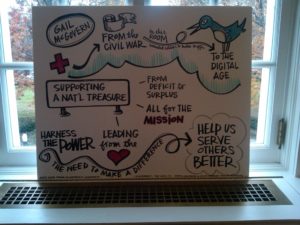A set of visual notes from yesterday’s Forum on Nonprofit Leadership.
Training America’s next leaders is nothing new to the American Red Cross. Ask any one of the hundred-thousand Red Cross volunteers age 24 or younger what life-enhancing skills they are learning, and they’ll talk about Red Cross activities that turn them into leaders.
It is only fitting, then, that when the White House convened thought-leaders in the nonprofit, corporate and government sectors to talk about ways to develop strong nonprofit leaders, the forum take place at the American Red Cross.
The White House Forum on Nonprofit Leadership highlighted the importance of the nonprofit sector as an economic force that needs effective leadership, and the need for a cohesive nonprofit leadership program. During the day, participating nonprofit leaders developed recommendations for recruiting and training nonprofit leaders, and identified potential ways to fund continuing leadership development programs.
“This is a critical set of conversations,” Melody Barnes, Director of the Domestic Policy Council at The White House, told forum participants. Barnes noted that the nonprofit sector employs 3.5 million people, 10 percent of the overall workforce. The nonprofit sector is growing faster than the business sector, and, in 2010, nonprofits contributed $779 billion to the nation’s gross domestic product.
“Effective leadership becomes more and more important each day as the nonprofit work load goes up and resources go down,” Barnes said.
Keynote speaker Kenneth I. Chenault, Chairman and CEO, American Express Company, said leadership was a complicated subject, and quoted Napoleon for the definition he prefers: “The role of a leader is to define reality and to give hope.”
“Leadership,” Chenault said, “should not be equated with title.” Leadership is earned through competence, caring and judgment—characteristics that can be exhibited at any level. He also told the audience that “leadership can be learned.” Effective leaders study leadership, they practice leadership and they welcome feedback about their leadership behaviors.
When it comes to identifying future leaders, Chenault looks for several attributes, including a concern for people. He explained that a good leader must have concern for people, because they have to make decisions that directly impact people’s lives. “Great leaders get that emotional connection,” he said.
Other attributes on Chenault’s list are a high EQ, or execution quotient—someone who does what it takes to get the job done; and, because change is occurring at a rapid pace, adaptability.
The forum was closed by Valarie B. Jarrett, Senior Advisor to the President, who encouraged participants to “write a new chapter in America’s story” as they develop and execute a strategy for developing nonprofit leaders.
Recalling President Obama’s work as a Community Organizer, Jarrett carried the message that President Obama understands the challenge and supports forum objectives.
Jarrett offered her own definition of leadership: “If you can’t motivate people to work together toward a common goal, you’re simply an expert,” she said, “Not a leader.”
The American Red Cross offers a number of opportunities for young volunteers to serve in leadership positions. Contact Your Local Red Cross for opportunities in your community


